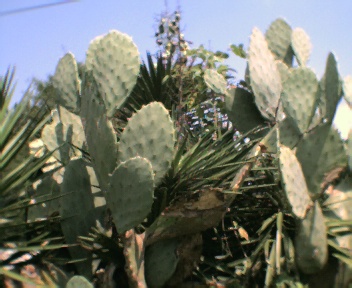|
| FREECACTUS.COM |
|
|
| CLICK TO OPEN IN A NEW WINDOW |
| Look at how this clump is blooming. |
|
|
| Almost every leaf has several flowers |
Propagation
couldn't be easier! Using beaker tongs or a piece of folded newspaper, just cut off a pad. (You can swap pads with a friend)!
Let the wound dry for about a week, then plant the pad in a shallow depression cut side down. Water every 2 weeks to get the
roots started. Minimal water is needed. Once every 2 to 3 weeks in the summer is sufficient for new plants. When established
they can generally survive on rainfall alone. As with any herbaceous plant, however, shriveling or wilting means they need
to be watered.
I am now offering cactus plants. Shipping/handling charges apply.
The genus Opuntia is the largest and most widespread of the family Cactaceae, subfamily Opuntiodeae.
It contains 181 species plus 10 naturally occurring hybrids, and is found from Canada to southern South America.
The plants are the large outdoor variety, and are excellent for landscaping. They bloom in the spring with large
yellow flowers. When the blooms die they form large purple pods that are quite attractive as well!
These cacti can survive freezing and grow 12 inches and more each year, forming new leaves and growing to 4 and 5 feet
in height. Planting instructions included.
The juice can be used to make...(read more)

1 large,prickly pear seed plant
$11
The flat-jointed
paddles of the prickly pear are not leaves, but an adaptation of a stem from which the fruit grows. The cactus paddles, "Nopales,"
are also a commonly used ingredient in Mexican recipes, including salads and scrambled eggs.
The
prickly pear fruit normally ripens and is ready for harvest during the late summer and early fall months. When gathering the
fruit, wear leather or rubber gloves to avoid contact with the cactus needles. They are a nuisance, especially the tiny soft-appearing
barbs of glochids on the fruit itself. The glochids are very difficult to remove if you get them in your skin. A long-handled
tong can also be used to pick the fruit from the cactus.
Giant sized leaves: 15+ inches long-$15. From mature plants they have been growing longer.
The genus Opuntia is the
largest and most widespread of the family Cactaceae, subfamily Opuntiodeae. It contains 181 species plus 10 naturally occurring
hybrids, and is found from Canada to southern South America. It is divided into the Opuntias
(prickly pears) and Cyclindropuntias (chollas).
Opuntia is a genus in the cactus family Cactaceae. Both prickly pears and chollas are included in this genus of about 250 species distributed as well as a myriad of hybrids.
The type species of the genus is the Indian fig opuntia Opuntia ficus-indica (most culinary uses of the term 'prickly pear' are referring to that plant).
Customer comments
Hey randall, no green thumb here, all i did was stuck them in the ground and gave them water. a lady at a nursery told
me to water newly planted yucca every other day for 2 weeks and thats all they need. the small yucca is the only one that
took off immediately. i was beginning to wonder about the
rest then they all came to life within the past month and started
growing good.
hey randall, my yucca and cactus are growing like crazy!
well the big yucca is slowly catching up and starting new growth but the small one just took off and started sprouting
within a few weeks. its doubled in size or more like tripled.
1 cactus stayed in tact and has 4 new big segments and starting a few more.
the other cactus broke in 3 or 4 peices and i planted them seperatley, now they all have new sprouts. 1 has 3 new sprouts.
ill have pics soon as i finish landscaping around them.
|